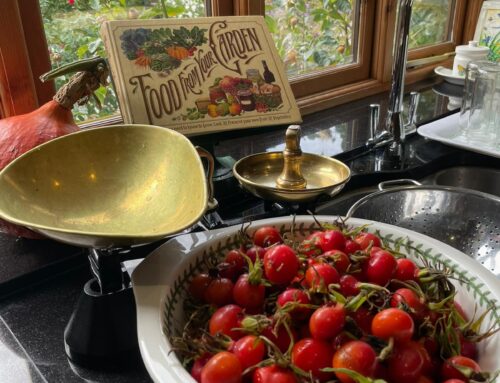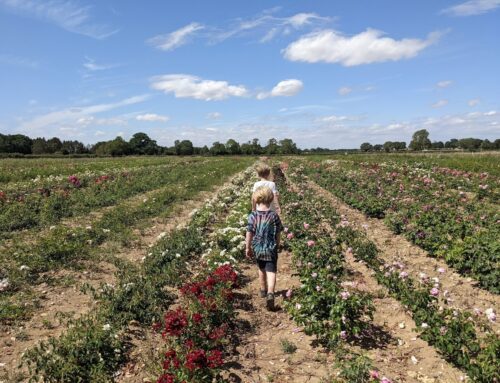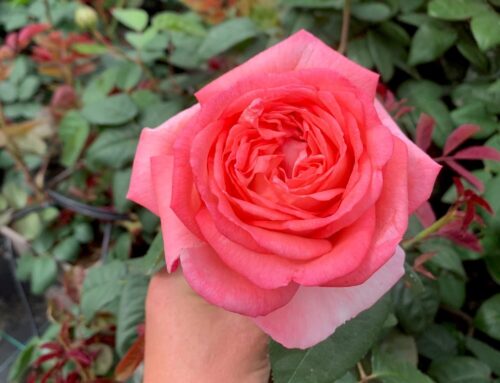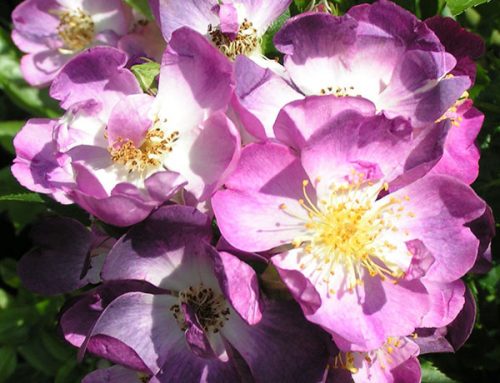Reflections on a Life in Roses by Trevor White

Trevor & family budding in 2005 (son Henry, daughter Lois and nephew Sam Outing).
I must have been around 20 when I took on a seasonal job with Peter Beales Roses at Intwood Nurseries in Swardeston, just outside Norwich. It was a five-mile cycle from my shared student house in the city – I remember the journey clearly because part of it was uphill, which was saying something for this neck of the woods.
My first introduction to work was heeling in roses with a man who, unbeknownst to me at that time, would come to have great influence over my future life’s work: Andrew Doubleday. The first thing that struck me was his old school-tie appearance and Trilby hat – reminiscent of the clothes worn by my grandfather in an old black and white photo from his days gardening at Ham House. Despite this, the image I have in my mind of Andrew remains in true technicolour.
As a life-long nurserymen, Andrew’s skills in the craft of roses were unmatched. But it was his passion, enthusiasm, respect, humour and generosity with his knowledge, that brought to life the true wonderment of roses. If I was in love with the rose before, I was now utterly bewitched. He soon put me to work alongside him, and as the saying goes, there were certainly ‘no flies on him’. After a hard day’s work, that slight Norfolk hill could well have been a Munro for all my legs knew. But despite the exhaustion I felt in my body, my head was buzzing in the knowledge that I had finally found my calling.

Trevor and daughter Lois budding, 2005
That summer, while I was helping at the Harrogate show, Peter suggested I go take a look at the rose garden at the Castle Howard Estate. So, after the show I hopped in the work van and drove over. I found myself walking around this stunning garden – the scent utterly sublime – and I can clearly remember being struck by the beauty and intense perfume of the exquisite Cerise Bouquet. After a rather hectic day, the wonderful fragrance filled me with this feeling of absolute tranquillity. I walked on in something of a trance – pausing to take in and admire each rose I came across: the charm of an Adam Messerich; the beautiful soft petals and delicate hues of Honorine de Brabant…
It suddenly dawned on me that the roses were getting harder and harder to see. The light had faded. The gardens were empty. And, to my alarm, the gates were locked. Thankfully, a group of gardeners finishing their shift discovered me frantically trying to find another way out. After a bit of explaining, they were very understanding and escorted me off the Estate. My relief that I didn’t need to spend the night on a garden bench was palpable.

Vanessa stacking the roses and cleaning the pots 2007
Before I knew it, I’d secured myself an allotment not far from my student house: filling it with roses and practicing the craft of growing and propagating different varieties. Not only was I now buying roses from Peter Beales, but sometimes selling them back to him. Rose catalogues and anything rosy became a relaxation away from the very scientific books I was having to study for my degree.
As my interest grew, so did my rose collection – any change I had seemed to go straight from my pocket into the tills of David Austin or Scotts of Merriott. When I finished Uni and Peter offered me a full-time job, I had never been so relieved – while I found microbiology fascinating theoretically, working in a lab all day just wasn’t going to cut it. Peter Beales Roses was a family business and a very welcoming place to work. I struck up some great friendships, and found particular comradery in Ian Limmer – now Nursery Manager for Peter Beales – who was a couple of years younger than me and just starting out in the rose trade himself.
But, with the business, office staff and orders growing, us nursery boys – who never seemed to grow in number – soon began to find ourselves struggling to keep up with the new pace. And it became frustrating that there no longer seemed to be the time to put the care and attention into each rose as we had been so well trained to do.

Trevor cutting budwood, 2009
In 1984 I took the plunge and rented half an acre of garden land from a very kind couple from Sloley called Russel and Freda Dyke. That Spring, I planted 10 thousand rose stocks by hand. Freda would come along each day with some cake she’d baked and say, “I never seen anyone work so hard”. And in all honestly, it felt like it! The support and comradery I found in the fields at Peter Beales felt like a world away. My Mum, who was well over 50, helped to tie-in the grafts that summer, and several days later her thumb nails fell off. When I wasn’t in the field, I was at the local library, trawling through regional copies of the Yellow Pages to find potential customers, writing down addresses and mailing off availability lists. I sometimes think it’s a miracle I made it past that first year.
I remember back then, saying to Ness, my wife-to-be, who fortunately always believed in my obsession to become a Rosarian: “I cannot promise you a rose garden”. Something I had hoped to have rectified by now, but four decades on, with things as busy as ever, I’m still yet to create her one. However, having grown around 150 acres of roses in our 40 years of trading, it brings me great joy and no small sense of achievement to know there are plenty of prestigious gardens of stately homes and many National Trust Gardens that have been created with the plants I grew – no doubt some roses still going from that very first crop.

Rose Judging at the Glasgow Rose Trials
Well, that’s how it all started, in the fast lane in Sloley.
40 years on and, remarkably, we’re still here. We still keep everything in-house and stick to the old ways of growing roses as much as possible, with the vast majority of tasks being done by hand and hard-graft alone: with care, craft, specialist knowledge and skill, underscored by a passion and love for what we do. As a family-run business, operating with a very small team at any one time, we are so thankful to the many wonderful people in our lives who have offered us help and support over the years, with everything from nursery work, to business advise, to technical expertise – without which we’d never have survived.
Rose growing isn’t the easiest profession – it can be insular, quiet, repetitive, and back-breaking at times – so we’ve been blessed to have had many brilliant workers over the years who have not only eased the load, but brightened our days in the rain, wind and baking heat of the Norfolk countryside. I think all our workers have become good friends – when they weren’t already good friends, family members or our children’s friends (of which many have kindly helped us out over the years).

Starting out: Trevor, Ness and daughters Simi & Esme next to a vase of Species roses
And of course, turning my passion and love for the rose into a livelihood, would never have been remotely possible without the unwavering dedication of my wife and our four incredible children. All our children have sacrificed many a school holiday and weekend to help during their childhoods (and adulthoods too). And now with Henry looking after the roses in Norfolk, Esme taking care of the customers remotely from Scotland, Simi who – on top of being an expert scarecrow maker – has got us out of more than a few fixes with her invaluable list of contacts and friends, and Lois who often drops her work in Edinburgh to support us in times of need, we know the roses, and the business, will always be in safe hands.
Thank you all so very much.
Well Henry here’s to you, remember keep those flies off! And Ness, maybe it’s time I get started on that rose garden…

Trevor with his crop 2010






